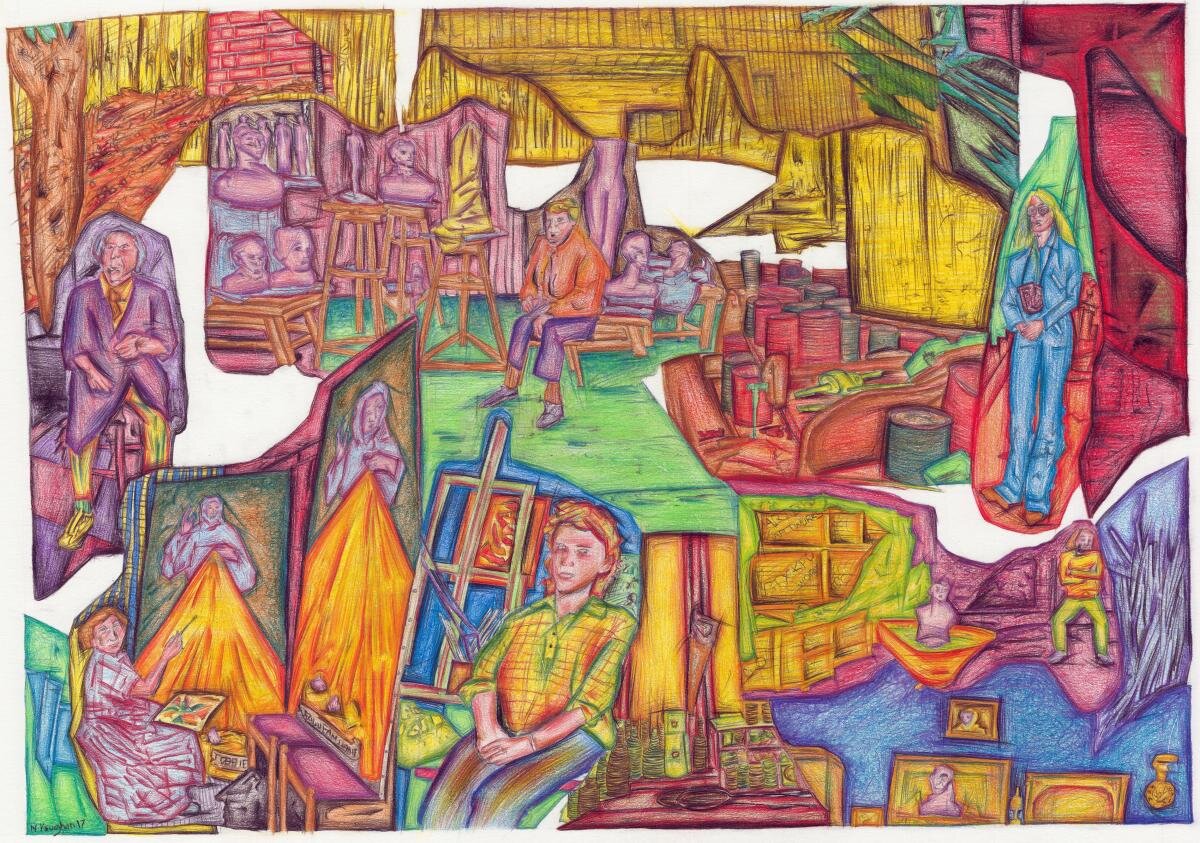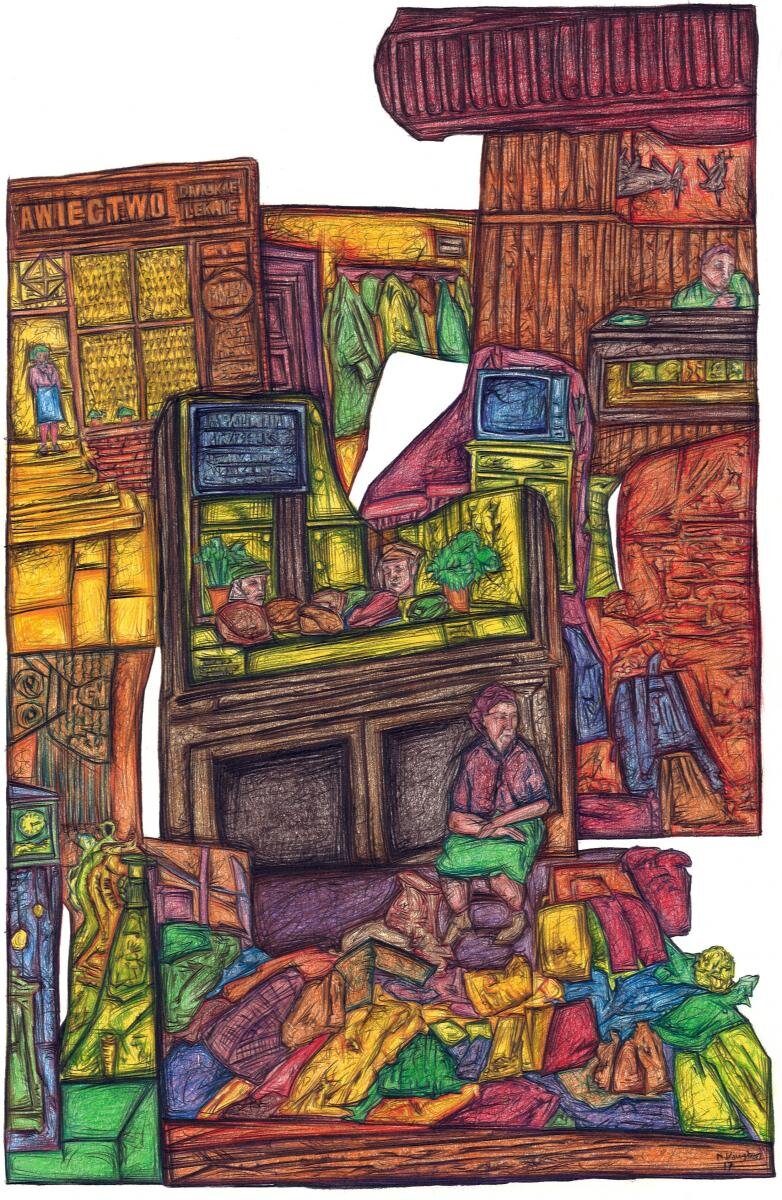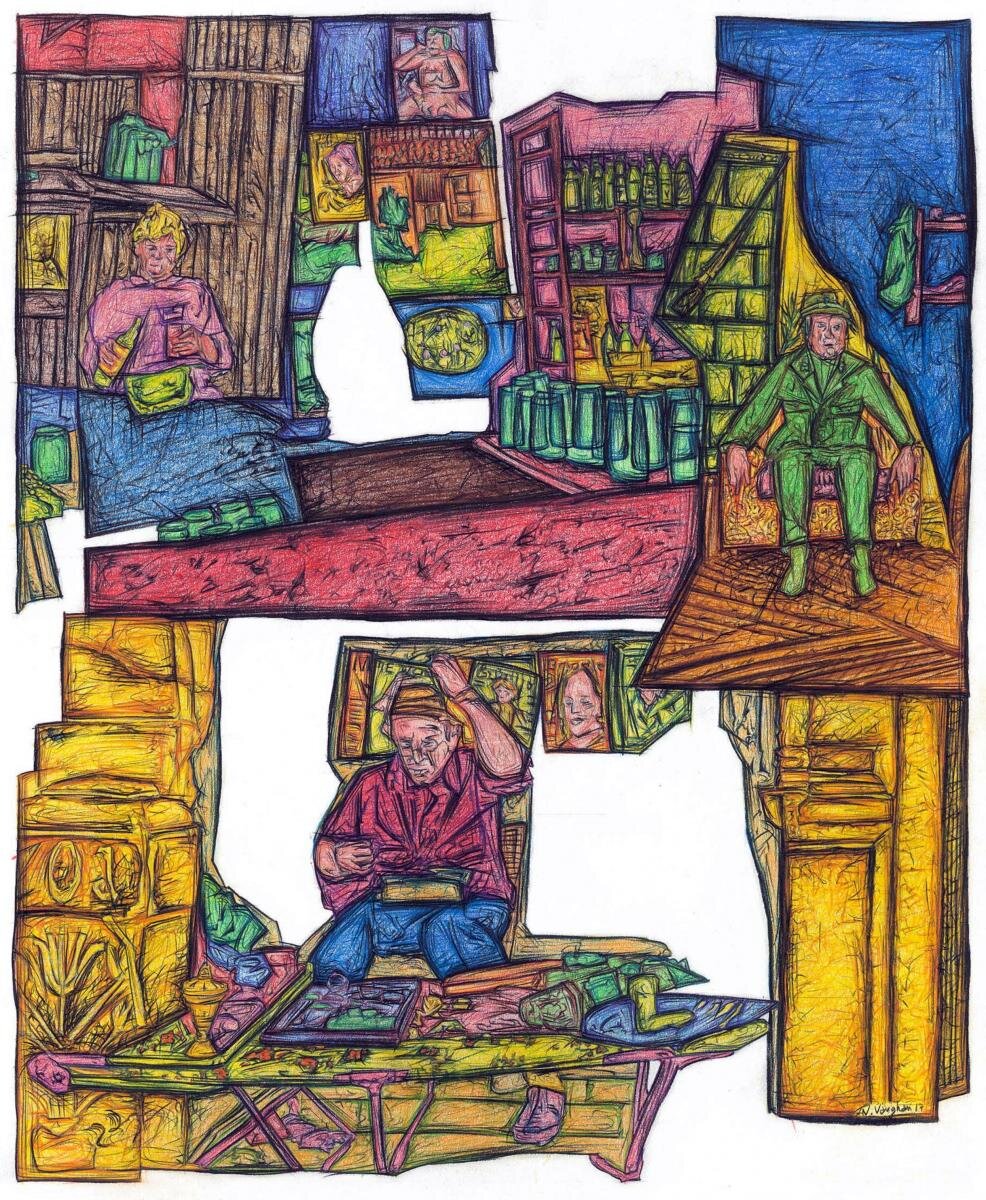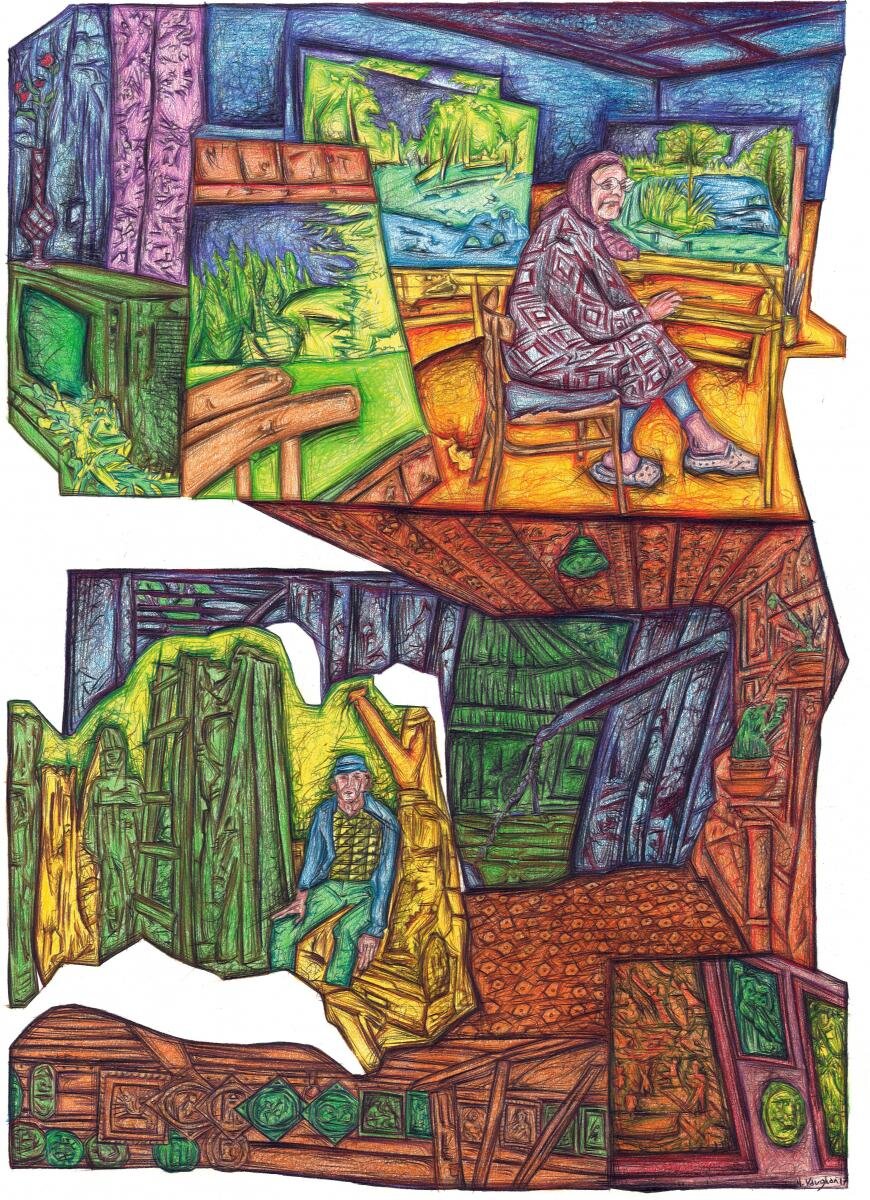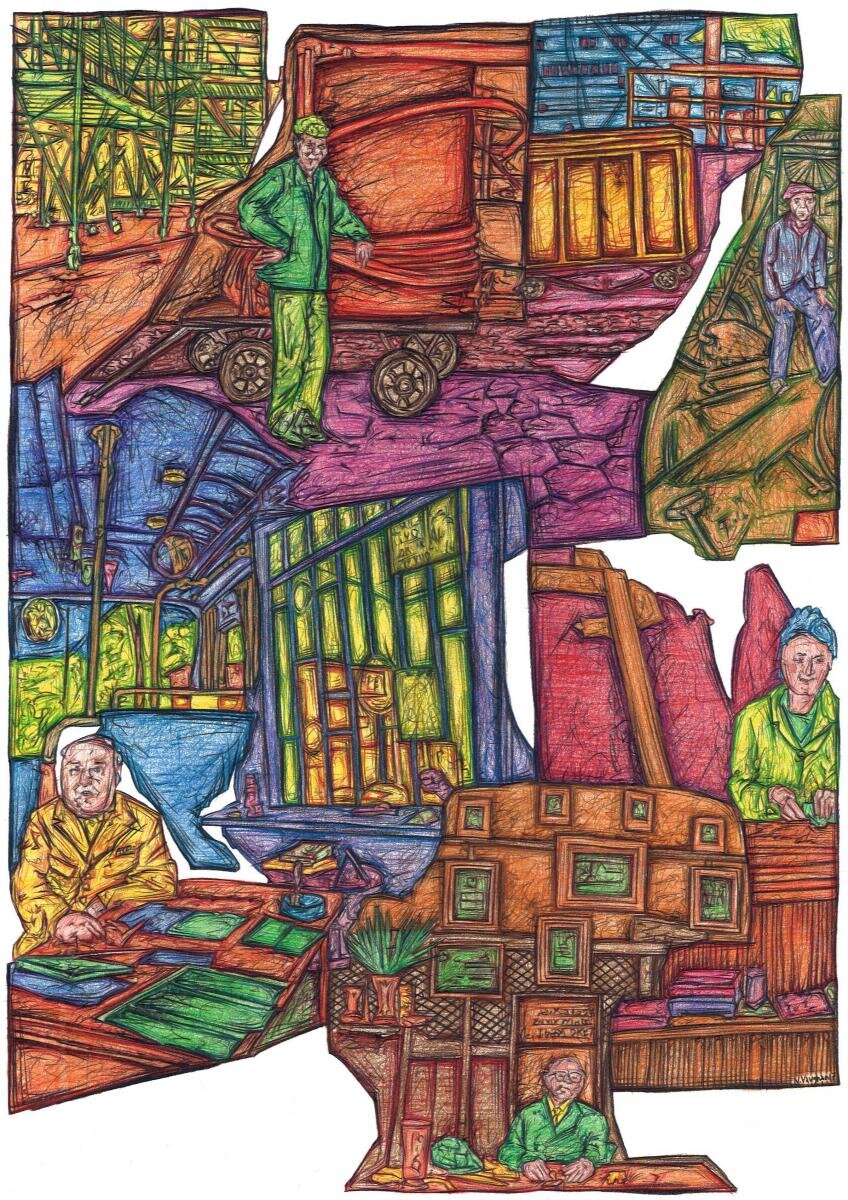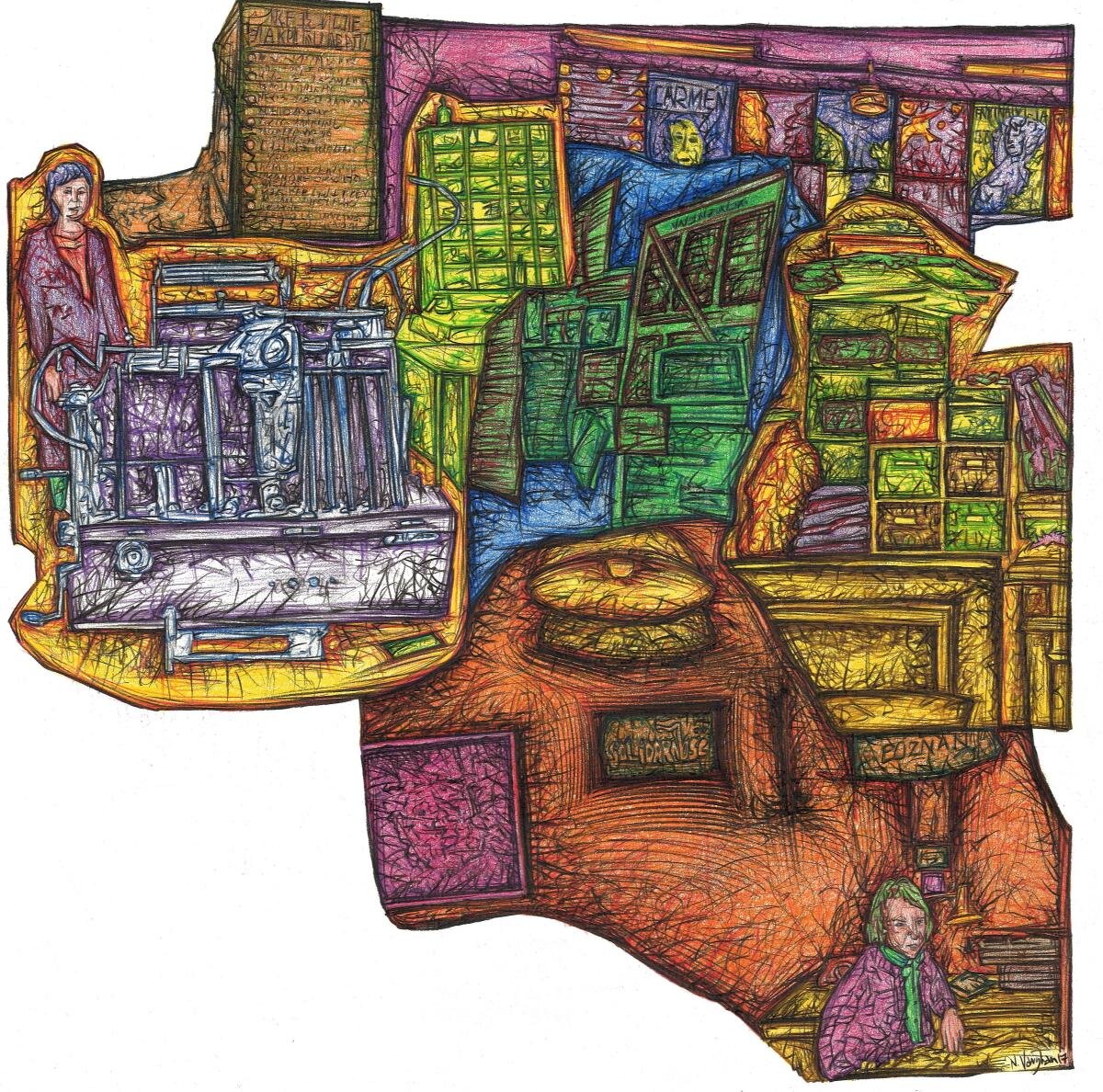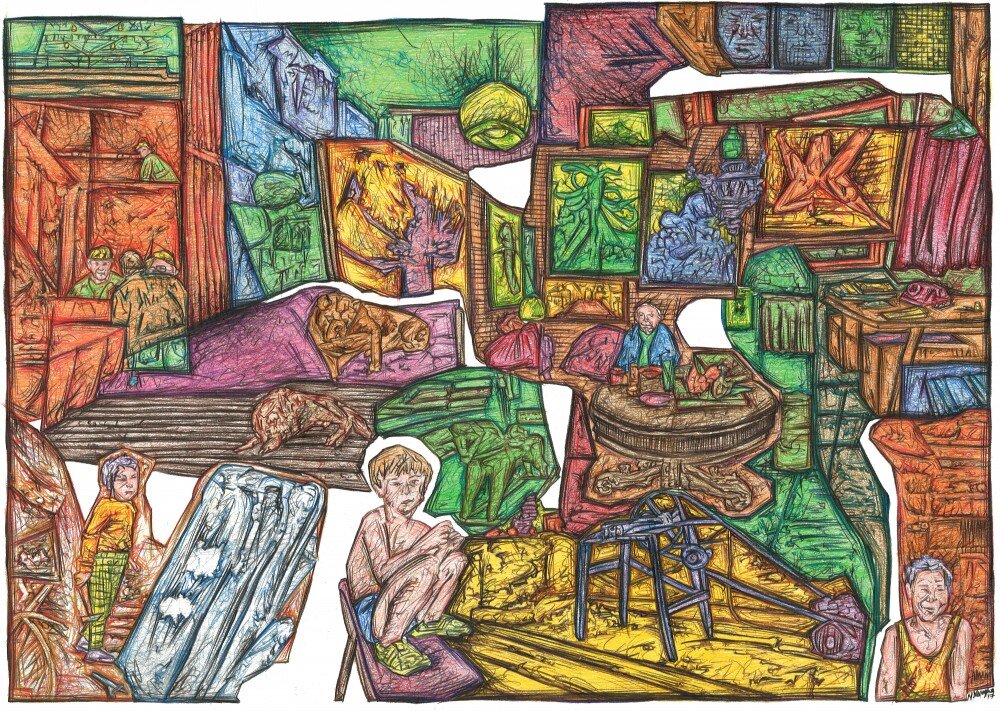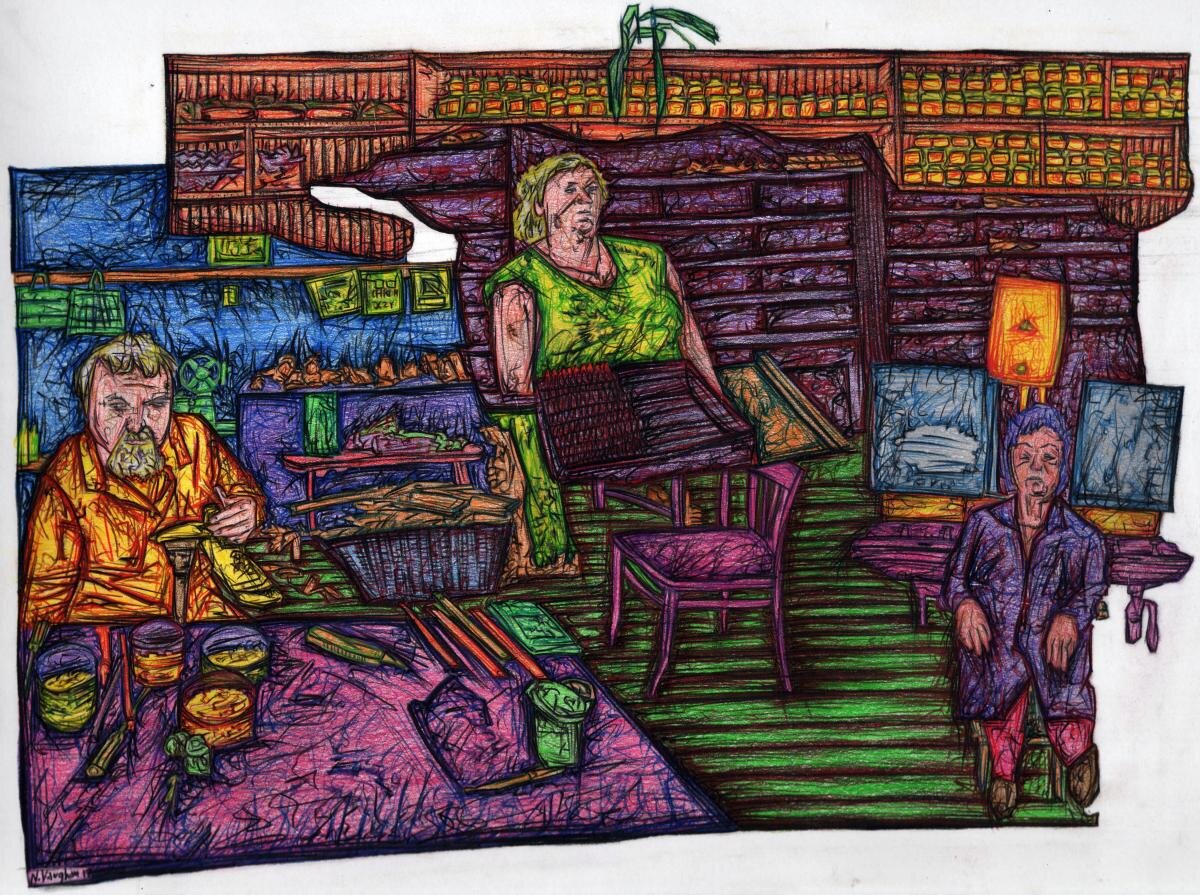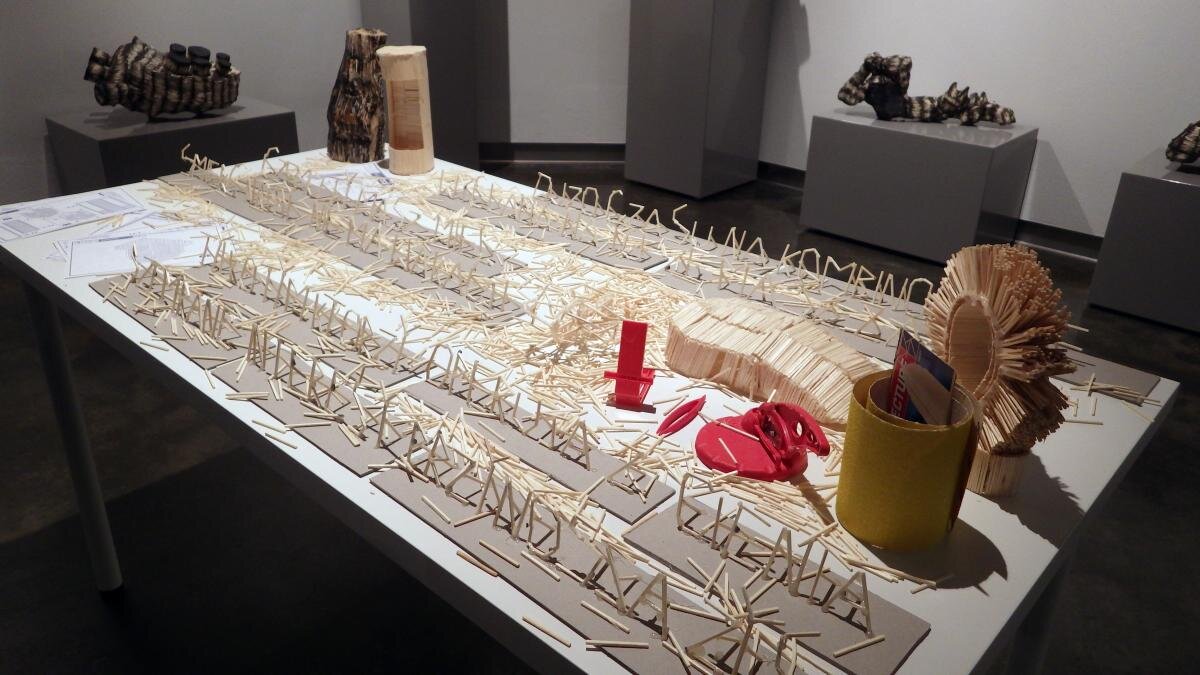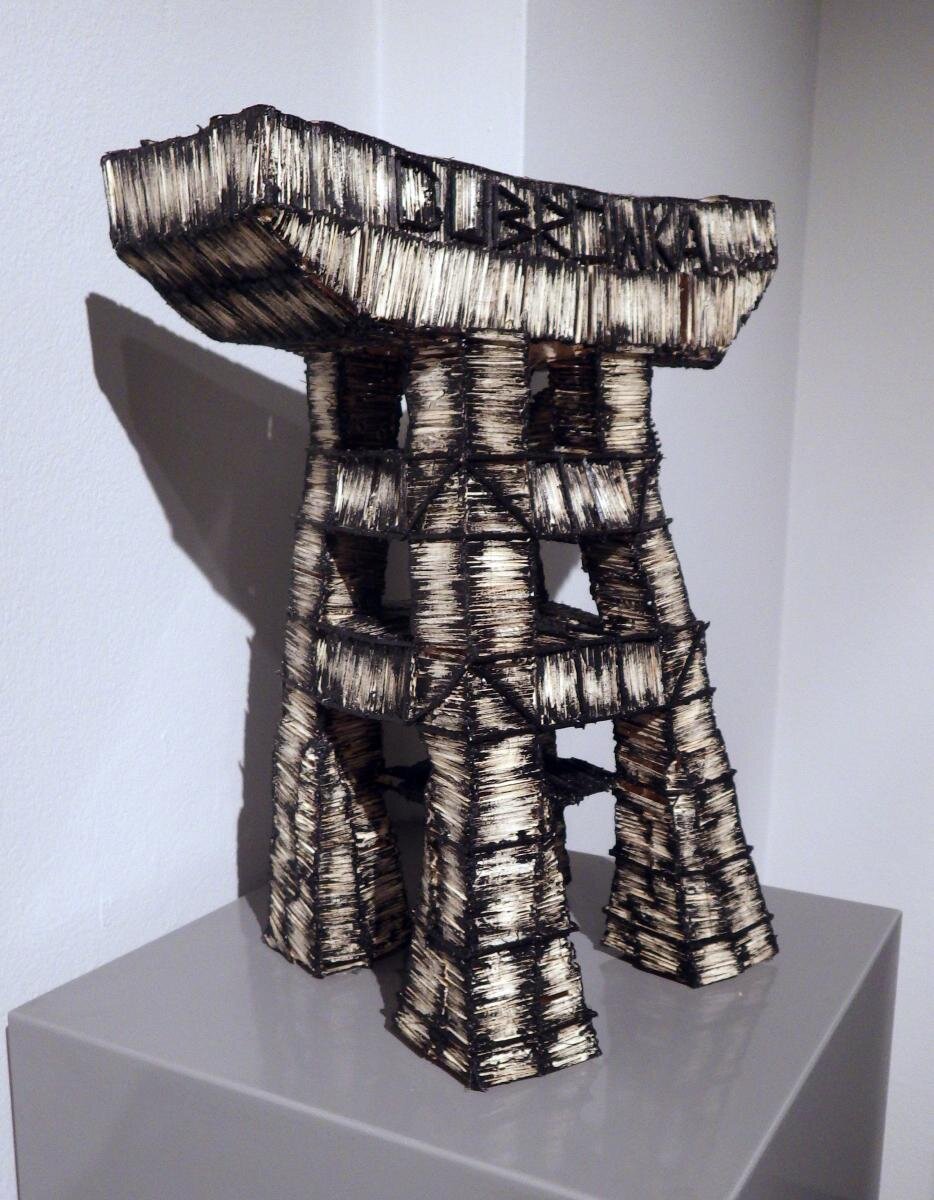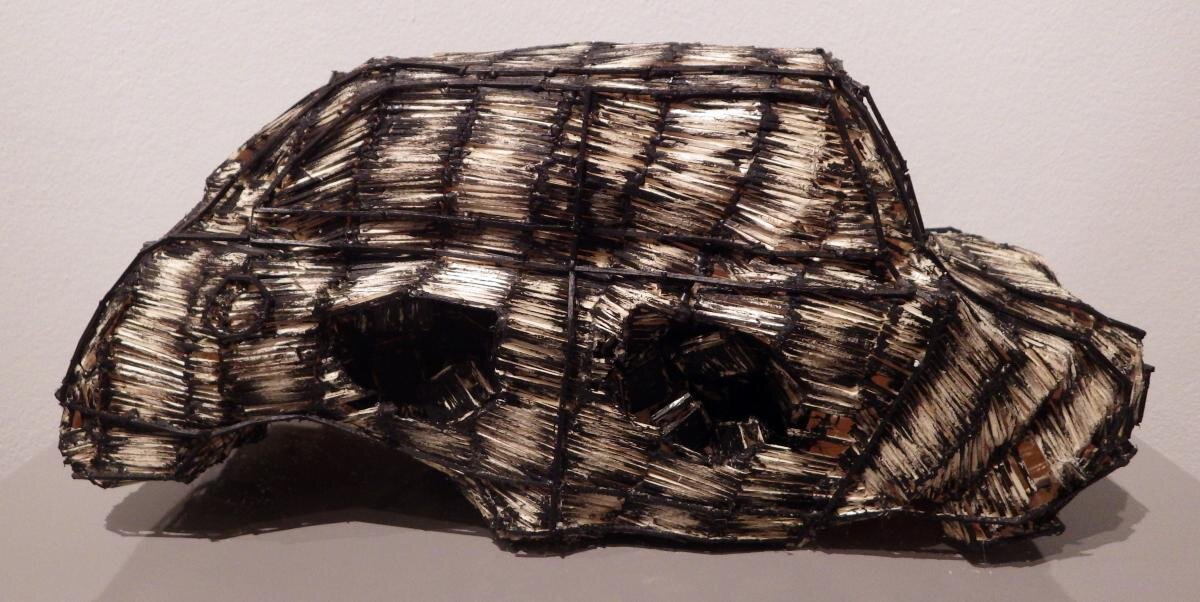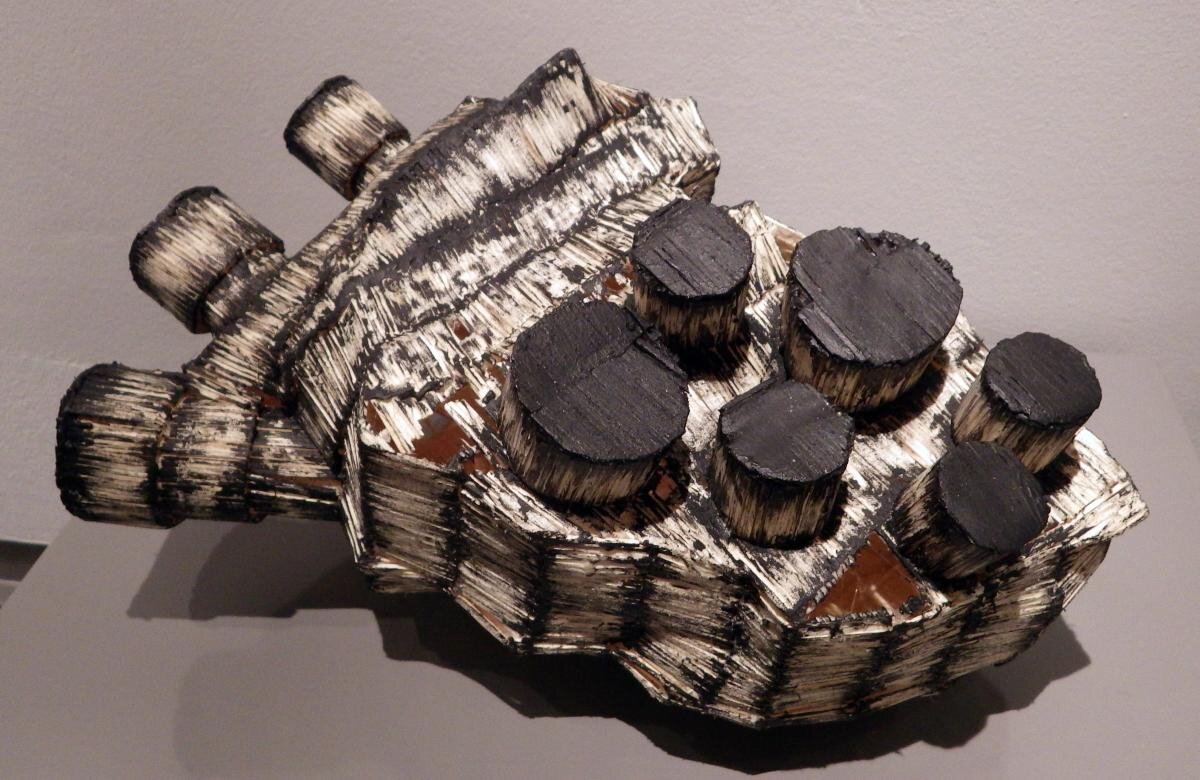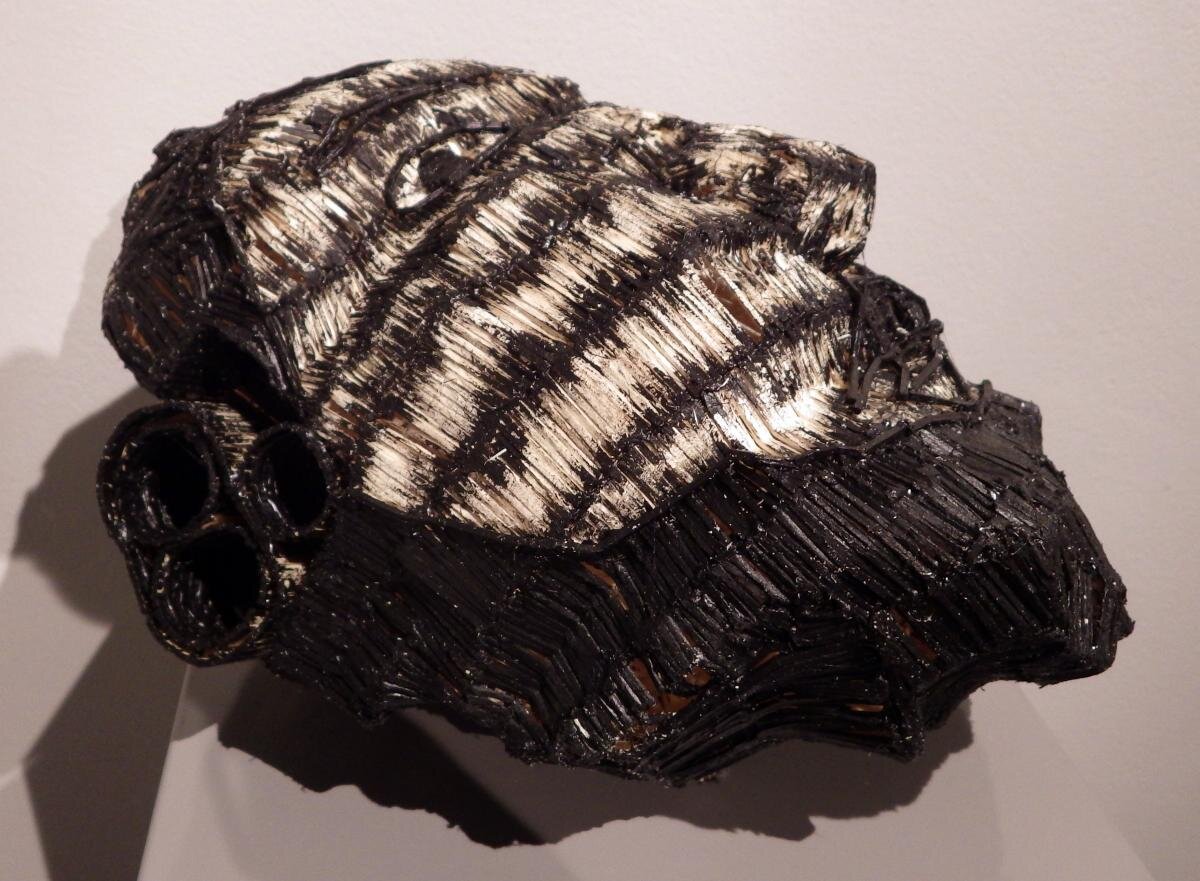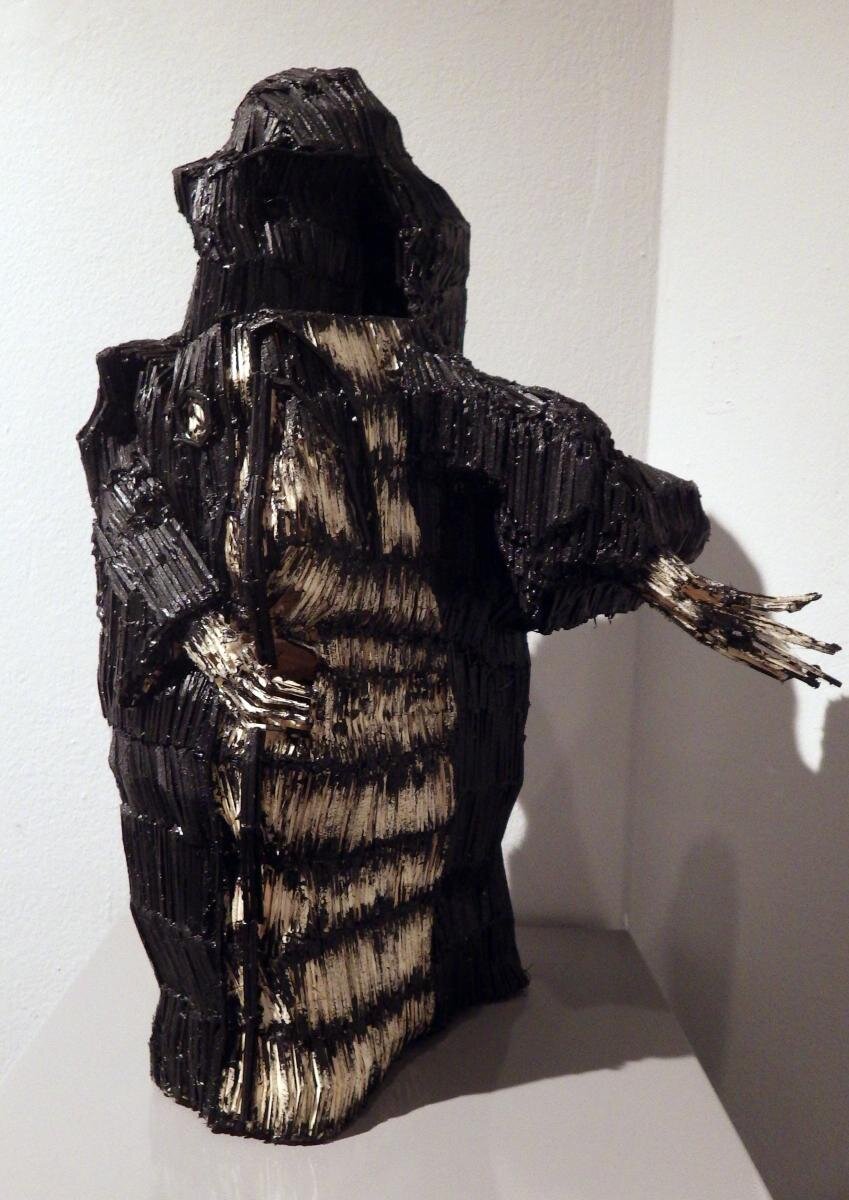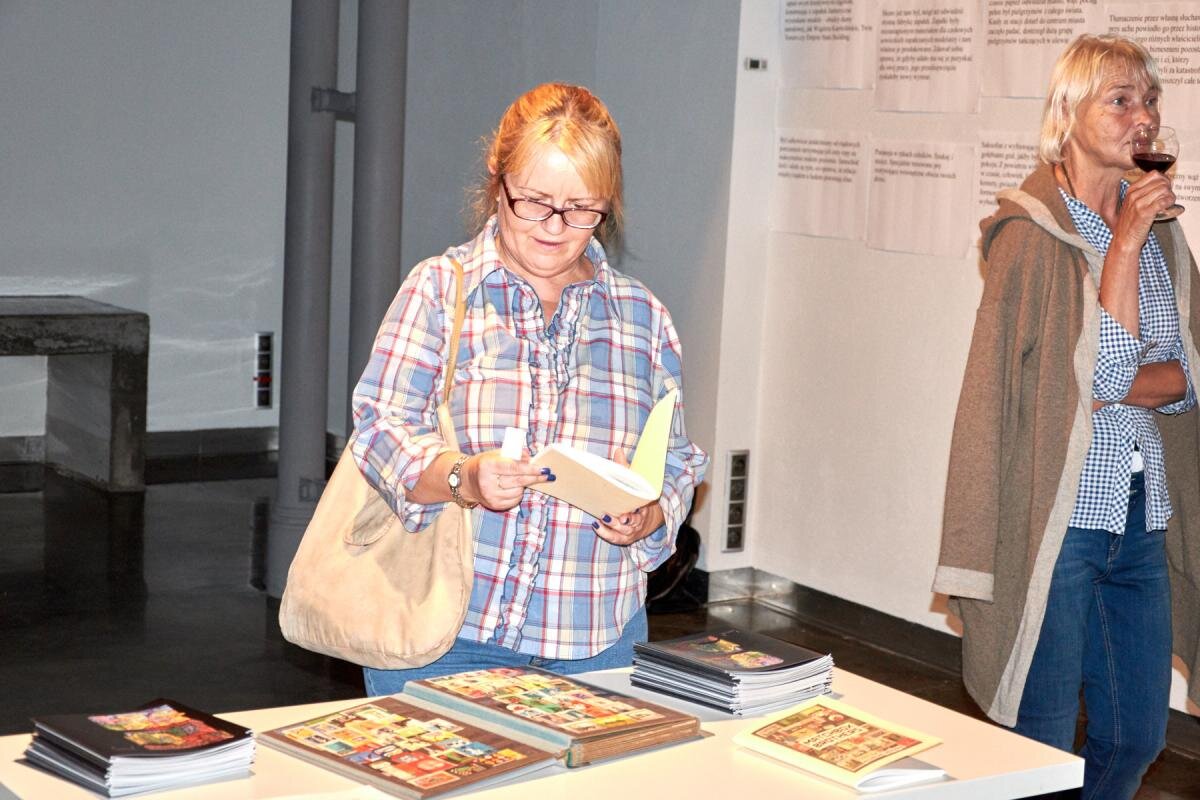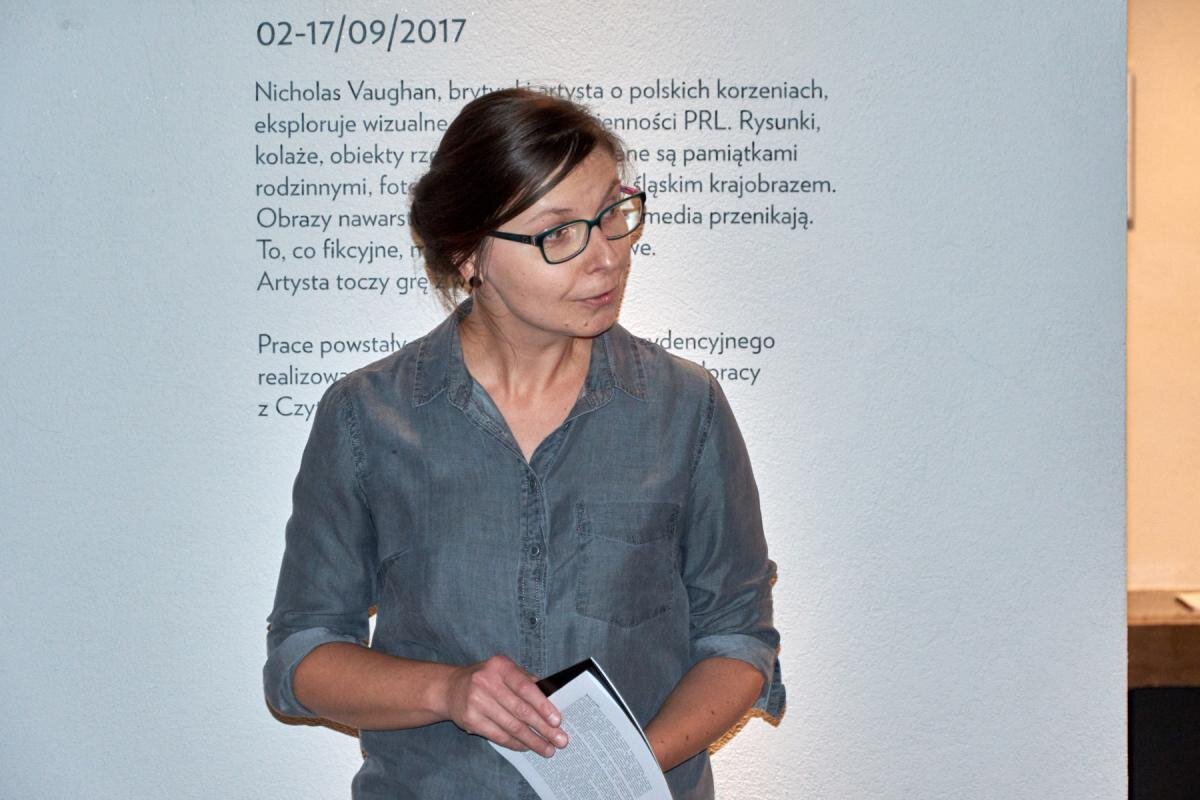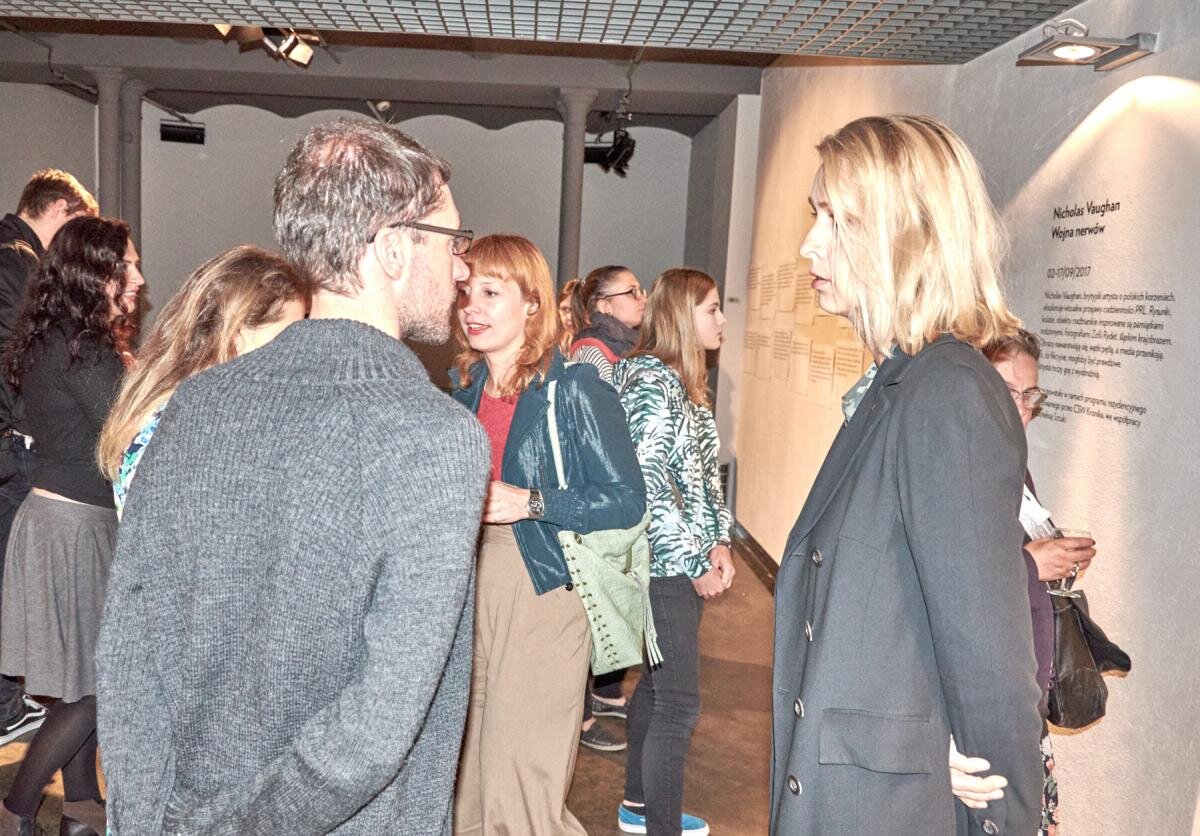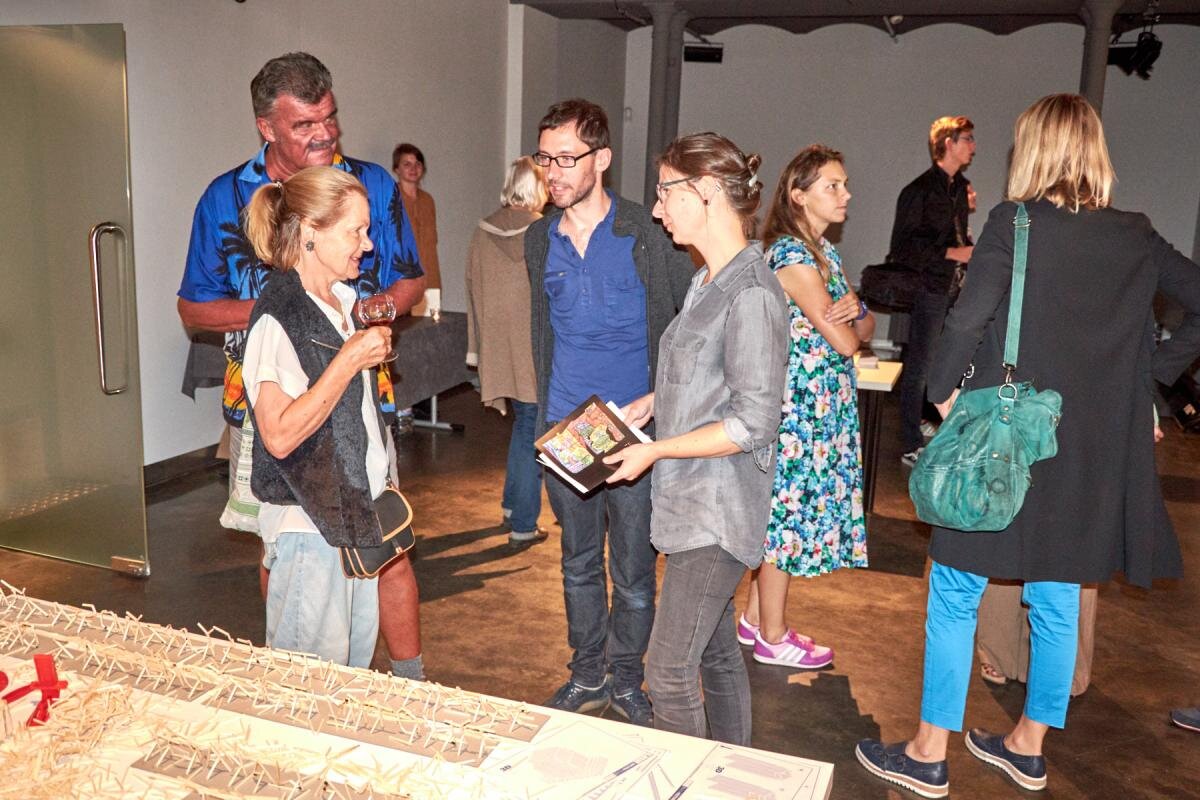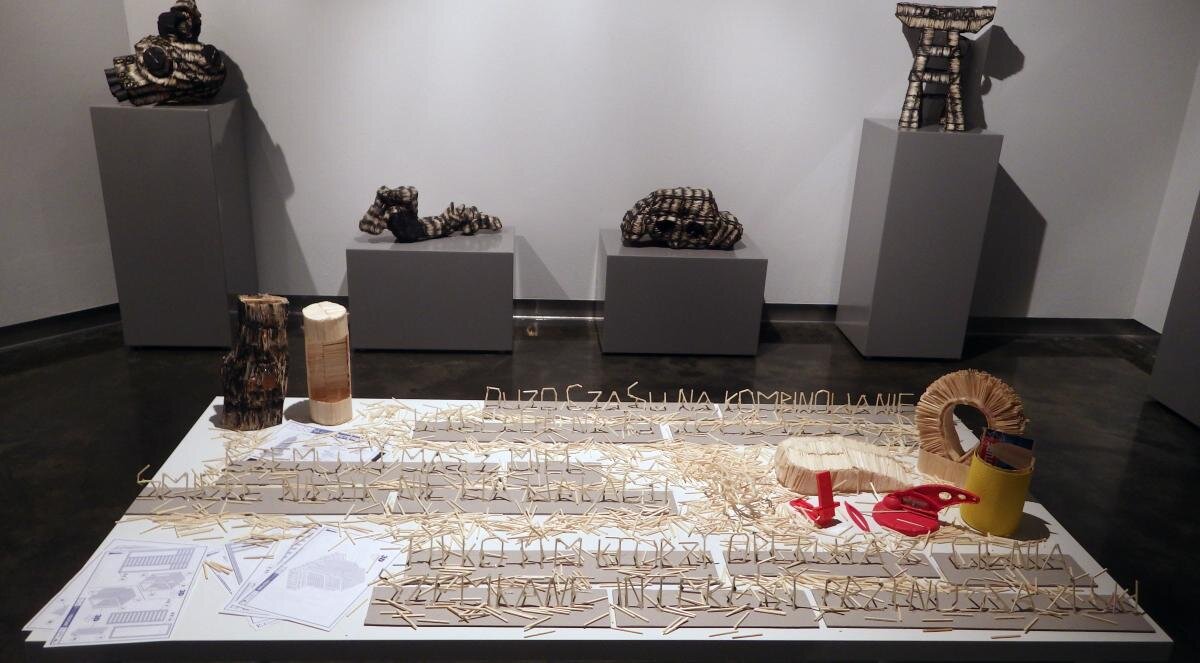Nerve War/Wojna Nerwów
‘Nerve War’ is the pinnacle of the last few years of my practice in which I focused on my Polish Heritage – my maternal grandfather originating from Sosnoviec, a town a few minutes away from Bytom where the residency is taking place.
In September 2017 I held a two week solo exhibition, Nerve War, at the Museum of Gliwice, in Poland. It concluded a year of research and development, and a two week residency at Kronika, a gallery for contemporary art in Bytom. It combined sculptures, drawings, original fictional text, and an installation. The drawings used the work Sociological Record by photographer Zofia Rydet as a starting point. One of the drawings I produced for the project is now in the museum’s permanent collection.
My previous work “Matchbox Brothers” explored my Polish grandfather’s passion for phillumeny, his difficult situation as an immigrant in the UK and the theme of personal memory. Using a matchbox covers album that I inherited I created a series of illustrations that combined Polish culture with that of Soviet design. Zofia Rydet's work spoke to me of different memories, that of a people and their trades, their daily toil that brought a nation together. Exploring her imagery and bringing it into plateaus that combine several photographs, allows the viewer to immerse themselves in a scene whereby isolated workers are brought into collaboration with one another. One selling tickets, one painting a picture, one mending a bicycle, one stamping a certificate, but all for the common good!
The cheery aspect of the drawings is designed to play against a darker feel of the sculptural objects. Matchstick representations of imagery taken from a research trip I did to Katowice/Czestochowa (matchstick museum), were complemented with a site-specific installation. ‘Petrol-heart (after Castrol GTX)’, an oily engine of the body and the beating black heart of Bytom. An organism with valves, cogs and exhaust flutes jutting from it that dominates the town centre in the form of a huge mural. In another piece, corrupt Orwellian pigs devour a man whole as seen on the side of a building outside Katowice.
Nerve War
Mr Fletcher visited Espegrad, a country in the eastern block on a research trip in the 1980’s. An arts academic travelling from the USA, he was researching for a PHD in phillumeny. His previous studies had been art related and through this subject, he had developed an interest in the construction of matchstick models. Collecting and studying labels during his working hours, their origins, histories, meanings, and their symbolic value. He also found interesting the way that they gave an account in a visual way of a country’s political past.
When he returned home on an evening, as a pastime he would satisfy his creative urges by developing fantastically elaborate models of national pride such as Capitol Hill, Twin Towers, or the Empire State Building. Once, he made a NASA space station complete with landing mechanism and lunar vehicles, ready to be deployed onto the moon’s surface. Shortly after and as if this was some inspiration, he began planning for his next space themed model, which was to be an exact replica of the cosmonauts living and working quarters on the Russian craft ‘Zewda’.
For the execution of this model, it was required that he would need to undertake some form of research, but for the freeze in communications between the two countries during the cold war this would not be possible. The closest that he could get was to stay at his relative’s place in the town of Nervesburg, in Espegrad, and use that as a base for exploring. Whilst he was there, he would also visit a well-known matchstick factory. A brand of matches that were indispensable by leading Soviet matchstick modelmakers were produced here and he knew that if he could source these for his creation it would give it a further dimension.
On arrival to Nervesburg, the first thing he did was to book a return train ticket to visit the Matchstick factory. On his way to the factory, he realised that the pope was visiting the town and so the train was full of pilgrims from all over the world. As he walked into town from the station it had begun to rain, and he could see a large group of them dancing in the downpour. Pure joy. He looked at his watch and saw that he had only half an hour to reach the factory before it closed. There was a danger that the whole place might have been closed because of the Pope’s visit, but he felt that it was worth the risk still.
Walking down two blocks he entered an area of industrial looking buildings with unkempt grass. Must be the street, he thought. As he rang a bell that seemed to echo and echo inside a huge warehouse with no reply, an old man walked past and tried to tell him something. Mr Fletcher, not speaking the local language, was unable to understand. The passer-by gave up and walked off.
Mr Fletcher continued to holler into the courtyard but got the impression that the place had been shut down for years. Crestfallen he turned on his heels and was just about to beat his way back down the street when a little old lady wearing black answered the door. Ushering him in with friendly tones he was escorted through ticket offices and then into an area that served as a small theatre.
A personal translation at his ear guided him through the history of the building and its various owners. Two rich Russian businessmen stuck in is mind as the final occupants and the ones that were responsible for a calamitous fire that had finally destroyed the place. As he wandered through the gutted building between the gigantic machinery, he put two and two together. Surely the Russian matches that were introduced by the last owners were the ones he was looking for.
He stumbled out into daylight his head swimming with ideas. An alleyway took him back towards the centre of town but via a bazaar that was on the verge of closing. A few people milled about in a car park, some still searching for bargains. Through a gap in a coatrack and a pile of old records and junk, he caught sight of a bookseller. He moved closer, attracted by the bright colours and abstract cover design of one in particular.
“Nerve War?” proffered the seller in a low voice. “This is a copy by an author long since banned on these shores.” Fletcher dished out some money and hurried off. Once back at his relatives he retired to his room and lost himself in the book. Nerve War, the book opened, according to a CIA description from 1956 is a psychological form of warfare carried out on a population by its government. Extreme paranoia and fear rule all situations, people, and events.
Later that evening he told his cousin that his whole project was hanging in the balance as he failed to find the right matches. His cousin showed concern and then remembered hearing of matchstick’s art being produced in a town called Hel. Mr Fletcher grabbed his cousin’s hand in excitement and asked for more details on how to get there. Coach travel to and from Hel on the bus 666 he was told.
Next morning, he made his way down to the bus station and queued to purchase his ticket. The official sold him a ticket and passed it behind him for rubber stamping by a colleague in a stiff suit thinning on top. Halfway through the journey, he looked up from reading his book and caught sight of an enormous pithead in the distance. It was partly obscured by a swooping dark figure who he discerned to be a grim reaper with a hammer and a sickle on the lapel of his cloak.
Overhead in the background, the towering, gigantic structure of 'DUBROWKA' could be made out. Crowds of miners streamed from below. As they gazed, panic-stricken, up at the ominous lord of darkness above them, he swept with his scythe and, like scattered grass, fell a few. Each time a mine closes, the fates of hundreds of men and their families are sealed.
The weather began to change and storm clouds drew in. The day grew dull and as he strained to see through the window, he could dimly make out a black soiled beating heart. It was a fuel-soaked organism for sustaining life. It pumped sooty lubricant through its aorta. It was a mechanized but organic vessel for the re-oxygenation of bad blood. Exhausts sprouted from a semi sponge like substance with capillaries prickling. Fluids oozed into a nearby puddle.
Motorists gaped open mouthed as they sped past in horror. What was this foul looking sight? Putrid petrol seeped from its undercarriage. It was a parched-looking object that could only be revived by a glug of diesel otherwise would suffer a fate worse than dehydration. It was utterly dependent on state-sponsored oil deals for keeping the price at an all-time low. The car, the king, and the engine that keeps the relationship between government and its people strong.
As night fell, they approached a heavily guarded checkpoint. Tanks, jeeps, military vehicles, land rovers everywhere. Barbed wire and rolls of electric fence ran back as far as he could see. To one side stood a Fiat 126 that had been rebuilt for the purpose of smuggling goods. Iron reinforcement bars and deep cavities penetrating far into its door panels.
A smugglers booty could be seen as a treasure trove of gold doubloons stashed within. Concealed cigarettes. A consignment bound for the black-market. A license to dubiously deal. Border control at the ready for an inspection of every nook and cranny. No crack left unturned. Paranoia at the hands of the customs officers. Search and destroy. Sniffer dogs tearing through the upholstery in the interior of your doors.
To escape the repression and tyranny of the day, he set off to an underground jazz club that he had heard about from someone he met on the bus. A place where you could be guaranteed that when the music started the caution in the crowd would drop. A saxophone with doves flying from it was being played like a peace pipe for the people.
From out of the air a time traveller appeared, a man who watched comets, stars and constellations form and reform, dissolve, combust, and grow or be born again. The ever-renewing property of the cosmos and its precious grip over humanity. A star falls or is made, and a hundred million lives depend on this. An enlightened person in his craft with compasses to guide him through the universe. Dials, satellites, antennas: all spinning to magnetic north. True knowledge and freedom to the one who can give themselves up to the wonder of the galaxy.
Once out of the club, he walked through the main square in the town. He gazed up at a mural that covered the entire side of a housing block. Escher-like stairways weaved in and out of one another. On them, some medieval hooded monasterial figures walked, whilst above them, in the air, leather-winged contraptions beat on the spot. At the foot of one of the stairs, a giant serpent emerged from a tunnel. It slithered on its belly, ever the mistrustful and deceitful creature. There was a feeling of disorientation and confusion to the scene. An atmosphere where thoughts could be warped, and perceptions distorted.
Mr Fletcher spent the night looking for the matchstick artists. In the street, he bumped into two that were from Russia but had Espegradian descent and were keen to tell him their story. “We had been making models for many years, but when we heard about the factory going up for sale, we knew that this could be an obvious way of making our work more ambitious. We moved into the factory and ran it successfully for a good few years. With those huge machines, we had the ability to make many models a day and the plan was to begin producing enough to be able to flood the folk-art market of Espegrad. In many of those rural areas the local people create their own, but in more touristy places you will still get demand for more cheaply made reproductions. We were doing pretty well, in particular, any models of religious buildings or famous landmarks were popular. Word spread quickly and many people would flock to our factory shop especially around Easter or Christmas. That was until the fire…”
Mr Fletcher, who had been listening in silence up until that point then put in “So you are the Russian businessmen, and I cannot purchase the matches you used to produce any longer?” This they confirmed. He left them chatting away on the pavement and continued his evening tour of the town.
Dawn found him in the staircase of the local church. It had been a rough night’s sleep and his hair was dishevelled and his eyes bloodshot. Also, one shoe was missing. Still trying to fabricate the meaning of his dreams with the reason for his footwear to be missing he stumbled down the street. He was heading to the bus stop. On his way, he came across a sounder of swine and their herder.
The group of pigs began to circle him closely. They wanted to interrogate him. Find out what he had been doing and why? What he knew about the Russian businessmen? He replied, “that he had never met them.” The pigs then moved in menacingly as if to quieten him. The next step was quite curious. Three of them began to probe his foot, licking between his toes with their tongues, constructing a map of his meanders, tasting the salty secretions that fear was forcing from his skin. One of them started to nibble his toes.
THE END
This is a work of fiction. Names, characters, businesses, places, events and incidents are either the products of the author’s imagination or used in a fictitious manner. Any resemblance to actual persons, living or dead, or actual events is purely coincidental.
Nicholas Vaughan, London, 1st September 2017
Polish media coverage of Nerve War/Wojna nerwów:
Gliwice Council // Gliwice Museum // Czytelnia Sztuki // Katowice.wyborcza
O.pl // Cojest Grane 24 // Radio Katowice // Magazyn Szum
